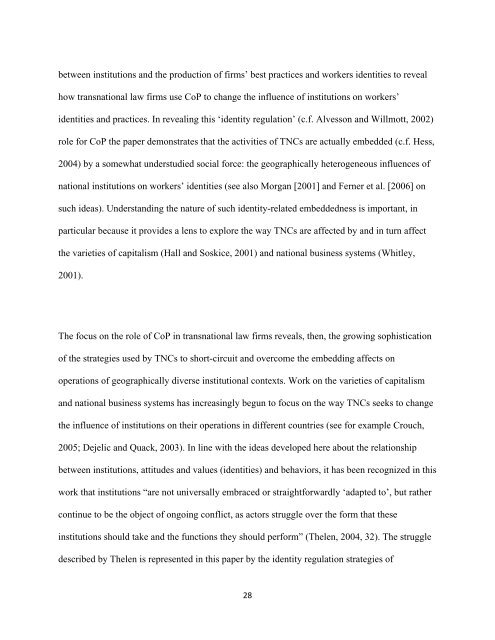Learning to be a lawyer in transnational law firms: communities of ...
Learning to be a lawyer in transnational law firms: communities of ...
Learning to be a lawyer in transnational law firms: communities of ...
You also want an ePaper? Increase the reach of your titles
YUMPU automatically turns print PDFs into web optimized ePapers that Google loves.
etween <strong>in</strong>stitutions and the production <strong>of</strong> <strong>firms</strong>’ <strong>be</strong>st practices and workers identities <strong>to</strong> reveal<br />
how <strong>transnational</strong> <strong>law</strong> <strong>firms</strong> use CoP <strong>to</strong> change the <strong>in</strong>fluence <strong>of</strong> <strong>in</strong>stitutions on workers’<br />
identities and practices. In reveal<strong>in</strong>g this ‘identity regulation’ (c.f. Alvesson and Willmott, 2002)<br />
role for CoP the paper demonstrates that the activities <strong>of</strong> TNCs are actually em<strong>be</strong>dded (c.f. Hess,<br />
2004) by a somewhat understudied social force: the geographically heterogeneous <strong>in</strong>fluences <strong>of</strong><br />
national <strong>in</strong>stitutions on workers’ identities (see also Morgan [2001] and Ferner et al. [2006] on<br />
such ideas). Understand<strong>in</strong>g the nature <strong>of</strong> such identity-related em<strong>be</strong>ddedness is important, <strong>in</strong><br />
particular <strong>be</strong>cause it provides a lens <strong>to</strong> explore the way TNCs are affected by and <strong>in</strong> turn affect<br />
the varieties <strong>of</strong> capitalism (Hall and Soskice, 2001) and national bus<strong>in</strong>ess systems (Whitley,<br />
2001).<br />
The focus on the role <strong>of</strong> CoP <strong>in</strong> <strong>transnational</strong> <strong>law</strong> <strong>firms</strong> reveals, then, the grow<strong>in</strong>g sophistication<br />
<strong>of</strong> the strategies used by TNCs <strong>to</strong> short-circuit and overcome the em<strong>be</strong>dd<strong>in</strong>g affects on<br />
operations <strong>of</strong> geographically diverse <strong>in</strong>stitutional contexts. Work on the varieties <strong>of</strong> capitalism<br />
and national bus<strong>in</strong>ess systems has <strong>in</strong>creas<strong>in</strong>gly <strong>be</strong>gun <strong>to</strong> focus on the way TNCs seeks <strong>to</strong> change<br />
the <strong>in</strong>fluence <strong>of</strong> <strong>in</strong>stitutions on their operations <strong>in</strong> different countries (see for example Crouch,<br />
2005; Dejelic and Quack, 2003). In l<strong>in</strong>e with the ideas developed here about the relationship<br />
<strong>be</strong>tween <strong>in</strong>stitutions, attitudes and values (identities) and <strong>be</strong>haviors, it has <strong>be</strong>en recognized <strong>in</strong> this<br />
work that <strong>in</strong>stitutions “are not universally embraced or straightforwardly ‘adapted <strong>to</strong>’, but rather<br />
cont<strong>in</strong>ue <strong>to</strong> <strong>be</strong> the object <strong>of</strong> ongo<strong>in</strong>g conflict, as ac<strong>to</strong>rs struggle over the form that these<br />
<strong>in</strong>stitutions should take and the functions they should perform” (Thelen, 2004, 32). The struggle<br />
descri<strong>be</strong>d by Thelen is represented <strong>in</strong> this paper by the identity regulation strategies <strong>of</strong><br />
28
















